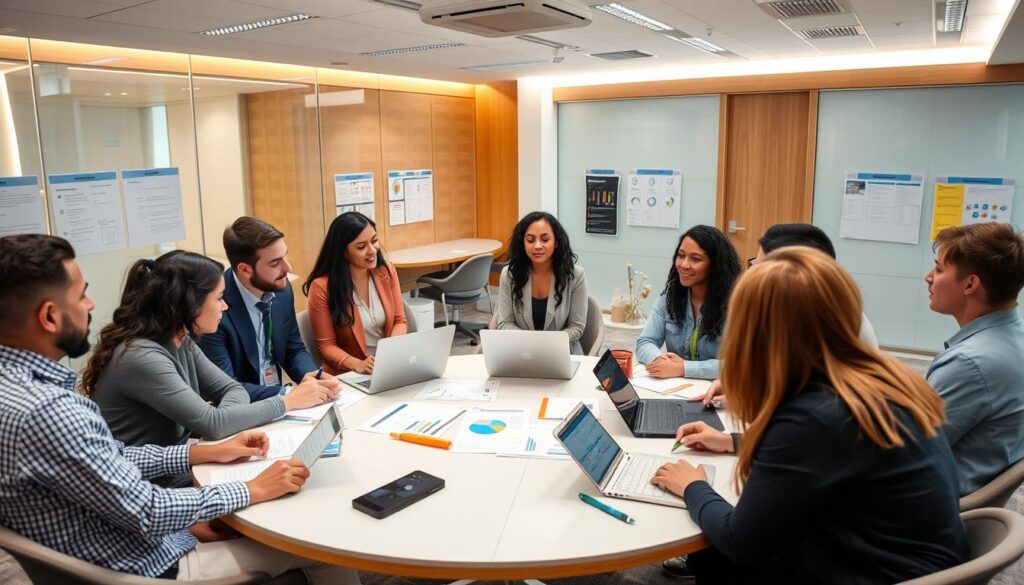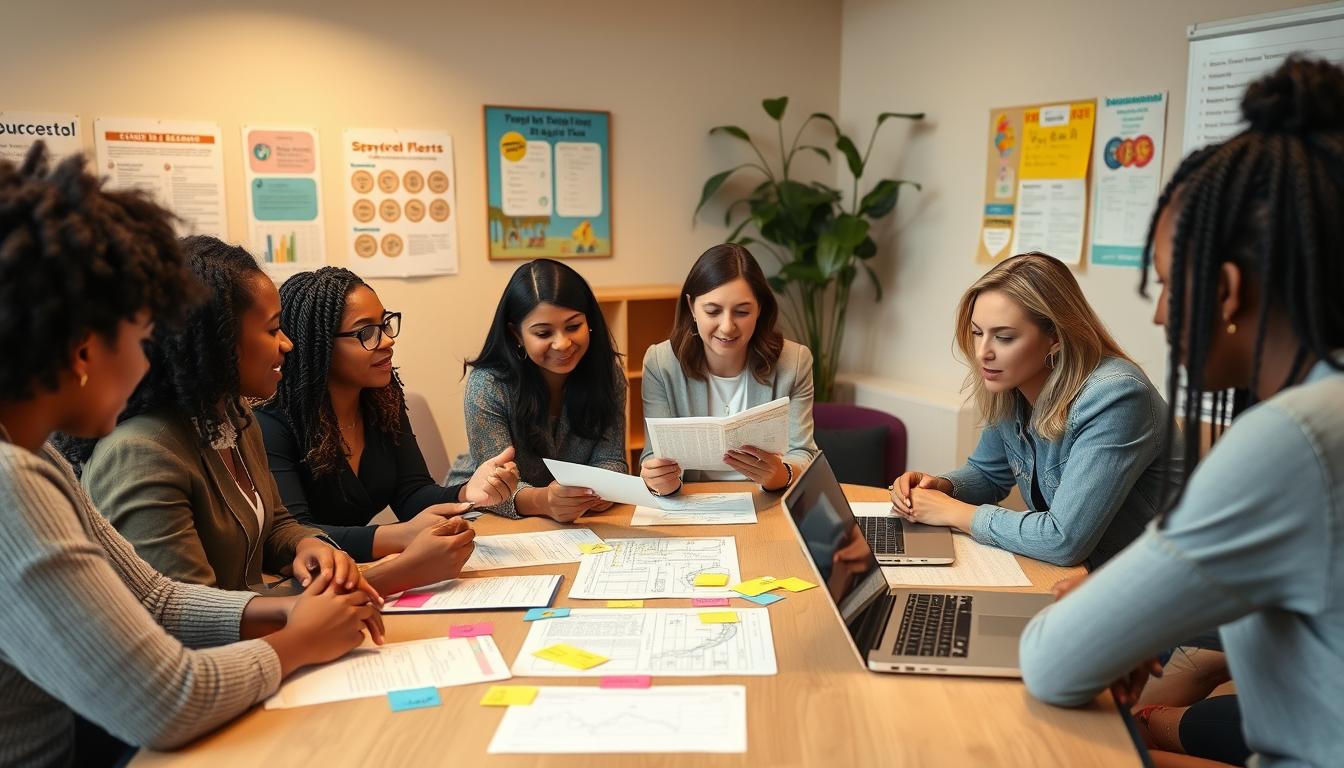As a therapist, your role in the Individualized Education Program (IEP) process is crucial. IEP meetings are key places where you work with educators, administrators, and parents. Together, you aim to get the best results for the students you help.
By knowing the IEP process well, preparing well, and using good communication and advocacy, you can help make IEP meetings successful. This success focuses on the student’s needs.
Key Takeaways
- Understand the purpose and importance of IEP meetings for students with special needs.
- Gather and document relevant student information to contribute to the IEP process.
- Collaborate effectively with the IEP team to advocate for the student’s needs.
- Employ active listening and clear communication during IEP meetings.
- Leverage your expertise to help develop meaningful, student-centered IEP goals and objectives.
Understanding the IEP Process
The Individualized Education Program (IEP) is a key part of a student’s education. It involves a team working together to create a plan for a student with special needs. This plan helps the student do well in school and in life.
What is an IEP?
An IEP is a special plan for a student with a disability. It shows what the student can do now and what they need to learn. It also lists the help and support the student will get to learn and grow.
This plan is made by a team of teachers, specialists, and the student’s family. They meet every year to make sure the plan is working and to make changes if needed.
The Importance of IEP Meetings
IEP meetings are very important for therapists. They are where the iep team communication happens. The team includes the student, their family, teachers, and other specialists.
Therapists help make sure the plan is good for the student. They listen, share their ideas, and help make the plan work. This makes the meetings focused on the student’s needs.
Therapists help understand the plan and add their knowledge. This makes sure the plan covers all the student’s needs. Working together is key to a good plan.
Preparing for an IEP Meeting
As a therapist, getting ready for an Individualized Education Program (IEP) meeting is key. It helps you contribute well and fight for the student’s needs. Start by collecting all the student’s info, like their medical history and current performance levels. This iep meeting documentation is the base for your role in the meeting.
Gathering Student Information
Get to know the student’s background, strengths, and challenges. Look over past IEPs, progress reports, and assessments. This helps you understand the student’s educational path. It also lets you tailor your suggestions to meet their iep team communication needs.
Collaborating with the IEP Team
Connect with the IEP team, like teachers and parents, to share ideas. Work together to understand the student’s needs and plan goals. This way, you bring valuable insights and strategies to the meeting. By teaming up, you help meet the student’s full needs.
Being well-prepared is crucial for a successful IEP meeting. By gathering all the student’s info and working with the IEP team, you can iep meeting tips for therapists. This way, you support the student’s education journey better. Remember, the more ready you are, the better you can help the student.

IEP Meeting Tips for Therapists
As a therapist, your role in the Individualized Education Program (IEP) meeting is key. By showing you listen well and communicate clearly, you can fight for your student’s needs. You also work with the IEP team to make a detailed educational plan.
Active Listening and Communication
It’s vital to pay close attention to everyone’s views during the IEP meeting. Listen actively to grasp the student’s strengths, challenges, and goals. When sharing your professional thoughts, speak clearly and concisely. This way, your input is respected and understood by all.
Advocating for Student Needs
You know your student’s needs best as a therapist. When you advocate, do it in a collaborative and student-centered way. Emphasize the services and aids that will really help the student. Be ready to have open talks to find a solution that meets the student’s educational goals.
Keep in mind, the IEP process is about working together and finding common ground. Stay flexible and open-minded during the meeting. This attitude helps create a positive and productive space for iep meeting collaboration and student-centered iep meetings.

“The key to effective IEP meetings is to approach them with a spirit of partnership and mutual understanding, where everyone’s input is valued and the student’s best interests are the top priority.”
IEP meeting tips for therapists, How to prepare for IEP meetings
As therapists, we play a key role in the Individualized Education Program (IEP) process. We bring valuable expertise and insights that help students grow academically and developmentally. To make IEP meetings effective, it’s crucial to prepare well and understand the process.
First, let’s talk about why knowing the IEP process is important. The IEP is a legally binding document that outlines the educational and related services a student with a disability needs. Therapists work with the IEP team to create goals and strategies that meet the student’s unique needs.
Preparing for an IEP Meeting
Getting ready is key to a successful IEP meeting. Here are some tips for therapists:
- Review the student’s records, including past IEPs, progress reports, and assessment data. This helps you understand the student’s strengths, areas of need, and previous goals and interventions.
- Work with the student, their family, and other IEP team members to gather important information. This includes the student’s interests, learning styles, and any specific concerns or priorities they have.
- Create clear, measurable goals and objectives that match the student’s needs and the team’s vision. Be ready to present these goals and explain how your therapy services will help achieve them.
- Get familiar with the IEP meeting format and your role as a therapist. Understand the decision-making process and be ready to advocate for the student’s best interests.
By preparing well, you’ll be able to contribute effectively to the IEP meeting. This ensures the student’s needs are accurately identified and addressed.
| IEP Meeting Tips for Therapists | Benefits |
|---|---|
| Understand the IEP process and your role as a therapist | Ensures you can effectively contribute to the meeting and advocate for the student’s needs |
| Thoroughly review the student’s records and collaborate with the IEP team | Enables you to provide comprehensive information and recommendations tailored to the student |
| Develop clear, measurable goals and objectives | Helps the IEP team create a targeted and effective plan for the student’s success |
| Practice active listening and clear communication | Ensures your input is understood and valued by the IEP team |
Remember, the IEP meeting is a collaborative process. As a therapist, your expertise and advocacy are crucial in creating a student-centered plan for success.
Conclusion
Navigating IEP meetings as a therapist needs a deep understanding of the process. It also requires thorough preparation, and strong communication and collaboration skills. By using the tips and strategies from this article, therapists can help the IEP team and advocate for the student’s needs. They can also help create a comprehensive and student-centered educational plan.
The IEP process is a team effort. By working together, therapists can greatly impact a student’s academic, social, and functional progress. Important IEP meeting strategies for therapists include active listening, advocacy, and documentation. These are key to the success of the IEP process and the wellbeing of the student.
As therapists continue to be crucial in IEP meetings, it’s important to keep up with the latest best practices and strategies. This helps to optimize the IEP process and deliver the best outcomes for students. By following these IEP meeting tips and preparing well for IEP meetings, therapists can enhance their contribution and positively impact the educational journey of their students.
FAQ
What is an IEP?
Why are IEP meetings important?
How can therapists prepare for an IEP meeting?
What are some tips for therapists during the IEP meeting?
How can therapists ensure effective collaboration and communication during the IEP process?




